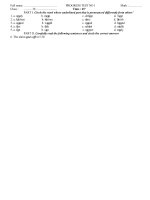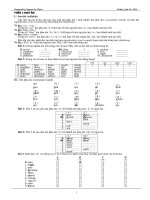English 10 MT fire emergency procedures
Bạn đang xem bản rút gọn của tài liệu. Xem và tải ngay bản đầy đủ của tài liệu tại đây (66.73 KB, 4 trang )
Loss Prevention’s
425
10-Minute Safety Trainer
Fire Emergency Procedures
Leaders Guide
Target Audience
All Employees
This program is designed to introduce employees to the need and importance of fire
emergency procedures.
1. Early notification of guests and employees to a potential fire is necessary to ensure their safety.
All fire alarms should be perceived as a “real” fire emergency and fully investigated. When the
alarm sounds remain calm, but act quickly. Employees should:
•
Control smoke spread by closing all doors, including laundry chute.
•
Clear the corridors by removing all housekeeping, maintenance, service carts and other barriers.
Place them in service areas or vacant guestrooms.
•
Help evacuate the area. Provide aid to guests with disabilities. Assist guests with directions to the
nearest exits.
•
Implement any departmental procedures. Each department will have separate procedures to follow.
Implement the procedures that you are responsible for as quickly as possible and then evacuate.
•
Meet at the rally point. When employees evacuate, they should proceed immediately to the
predetermined rally point.
2. During a fire emergency, employees must perform a set of tasks before, during, and after they
evacuate the facility in an organized and timely manner. If you discover a fire, employees should
remember to use C.A.R.E.:
•
•
•
•
Contain the fire. Close the door to the area containing the fire.
Activate the alarm. Go to the nearest pull station and pull the alarm.
Report the location of the fire. Using a house phone, guestroom phone, or radio, report the exact
location of the fire.
Evacuate and seal off the area. Ensure fire doors are closed. Alert the guests and employees in the
area and help them find the nearest exit.
3. Each hotel should have a full complement of fire extinguishers in compliance with local codes.
Extinguishers should be visually checked on a monthly basis to ensure they are in place and fully
charged. To use a fire extinguisher, remember P.A.S.S.
•
•
•
•
Pull the pin.
Aim the nozzle at the base of the fire
Squeeze the handle
Sweep the nozzle from side to side.
A fire extinguisher can only be as effective as its operator. Use portable fire extinguishers only if
you can do so safely and without putting yourself at risk.
4. Exit doors should not be locked or secured in a way that could prevent egress at any time. They
should remain free of obstructions and should only be secured through the use of panic hardware.
Exits should be clearly labeled. Care should be taken to ensure directional arrows lead to the exit.
Loss Prevention’s
425
10-Minute Safety Trainer
Fire Emergency Procedures
QUIZ
1. Most fire alarms should not be taken
as a “real” fire emergency.
a. True
b. False
2. When the fire alarm sounds,
employees should do the following:
a.
b.
c.
d.
Try to control smoke spread
Implement department procedures
Help evacuate the area.
All the above.
3. Upon discovering a fire, employees
should:
a. Never activate the alarm until the fire
is extinguished.
b. Leave doors open to allow smoke to
travel.
c. Use C.A.R.E.
4. C.A.R.E. stands for containing the
fire, activating the alarm, reporting
the location of fire, and evacuating the
area.
a. True
b. False
5. Extinguishers should be
checked on a annual basis:
visually
a. True
b. False
6. The “A” in P.A.S.S. stands for:
a. Active alarm.
b. Aim the nozzle at the base of the fire.
c. Alert guest of fire.
7. Exit doors are to remain locked at all
times.
a. True
b. False
When you have completed this quiz, turn it in to your supervisor.
Name:
__________________________________________________
Date:
__________________________________________________
For additional information contact the Loss Prevention Department at 770-604-2626
Loss Prevention’s
10-Minute Safety Trainer
425
Fire Emergency Procedures
QUIZ ANSWERS
1. (b) False. All fire alarms should be perceived as a “real” fire emergency and fully
investigated.
2. (d) All of the Above. Employees should control smoke spread, clear the corridors, help
evacuate the area, implement departmental procedures, and meet at the rally point.
3. (c) Use C.A.R.E.
4. (a) True. C.A.R.E. stands for containing the fire, activating the alarm, reporting location
of fire, and evacuating and sealing off the area.
5. (b) False. Extinguishers should be visually checked on a monthly basis to ensure they are
in place and fully charged.
6. (b) Aim the nozzle at the base of the fire. To use a fire extinguisher, remember to
P.A.S.S: Pull the pin, Aim the nozzle at the base of the fire, Squeeze the handle, and Sweep the
nozzle from side to side.
7. (b) False. Exit doors should not be locked or secured in a way that could prevent egress at
any time. Panic hardware may be used.
For additional information contact the Loss Prevention Department at 770-604-2626
Loss Prevention’s
425
10-Minute Safety Trainer
Fire Emergency Procedures
Employee Sign-Off
___________________
Date
___________________
Hotel
___________________
Training Facilitator
Today I participated in a training program which addressed the importance of fire emergency
procedures. I agree to observe and follow the safe work practices described to me in this
training. In the event of an injury, I understand that I am to report it to my supervisor
immediately. I understand that should I have any further questions regarding this program or any
safety issue, I should ask my supervisor.
For additional information contact the Loss Prevention Department at 770-604-2626









